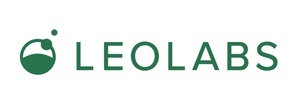Signatories agree to the need to accelerate activities supporting the removal of massive derelict objects in low Earth orbit to reduce risk to operational satellites
QUEENSTOWN, New Zealand, Feb. 14, 2024 /PRNewswire/ -- LeoLabs, the leading commercial provider of data and insights for space safety, security, and sustainability, today released a joint statement on debris remediation signed by representatives of commercial entities in collaboration with the Secure World Foundation (SWF).
LeoLabs and SWF led this effort in response to the continual accumulation of massive derelict objects (e.g. spent rocket bodies, etc.) in low Earth orbit (LEO). As of January 2024, around 29% of the total mass in LEO consists of these massive objects, 43% of which were left in orbit since the turn of the century. These objects pose the greatest debris-generating potential in LEO, putting the satellites the global economy relies on at risk.
Signatories to the joint statement agreed on two foundational observations:
- the debris-generating potential from the thousands of massive derelicts, primarily spent rocket stages and non-operational payloads, abandoned in low Earth orbit must be dealt with now; and
- there are persistent economic, legal, and policy challenges that are still hindering the development of solutions focused on the removal of these massive objects.
The joint statement will underpin the first Orbital Debris Remediation Summit co-hosted by LeoLabs and SWF in Queenstown, New Zealand on 20 February 2024. This event will bring together government and space industry leaders to accelerate critical activities supporting space sustainability. Those present will engage in discussions related to the various dimensions of reducing risk from massive derelicts through debris remediation.
"Everybody wins if we can retrieve remnants of decades-old space assets and allow for the next generation of missions to operate safely," said Darren McKnight, LeoLabs Senior Technical Fellow. "LeoLabs is proud to partner with the Secure World Foundation on this joint statement and summit in New Zealand tackling the challenge of orbital debris. We look forward to continuing to drive a global, data-backed conversation on space sustainability."
Peter Martinez, Executive Director of Secure World Foundation, said "It's not a question of whether we should engage in debris remediation, but rather what technical, policy and regulatory hurdles need to be overcome to make remediation practicable. For too long, remediation of massive derelict objects in LEO has been mostly an academic discussion, with no tangible actions in orbit. Someone has to take the lead to create a community of practice, and we are proud to have partnered with LeoLabs to bring together like-minded government and space industry leaders who want to move from remediation discussions to remediation practice."
Read or download a digital copy of the joint statement.
About LeoLabs (www.leolabs.space)
LeoLabs is transforming the way satellite operators, commercial enterprises and federal agencies across the world launch and track missions in low Earth orbit. Through its vertically integrated technology system, Vertex™, LeoLabs delivers the superior information needed to succeed in today's space race. With unmatched LEO coverage, real-time tracking and powerful insights, companies and governments rely on LeoLabs to safely innovate and execute a wide array of operations in space.
About Secure World Foundation (https://swfound.org)
Secure World Foundation (SWF) is a private operating foundation that promotes cooperative solutions for space sustainability and the peaceful uses of outer space. The mission of the Secure World Foundation is to work with governments, industry, international organizations, and civil society to develop and promote ideas and actions to achieve the secure, sustainable, and peaceful uses of outer space benefiting Earth and all its peoples.
SOURCE LeoLabs, Inc.

WANT YOUR COMPANY'S NEWS FEATURED ON PRNEWSWIRE.COM?
Newsrooms &
Influencers
Digital Media
Outlets
Journalists
Opted In




Share this article